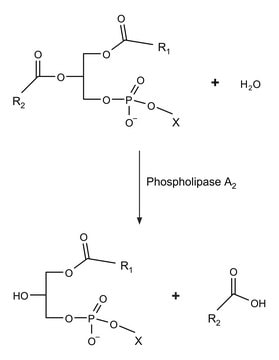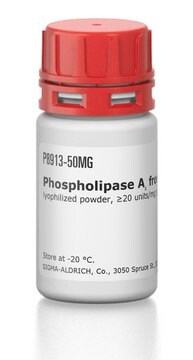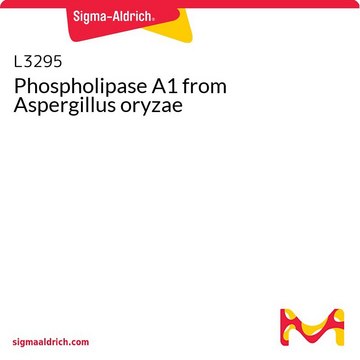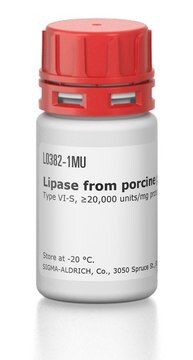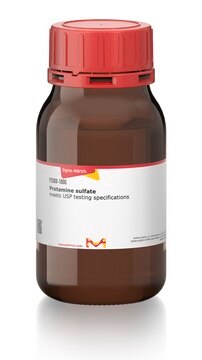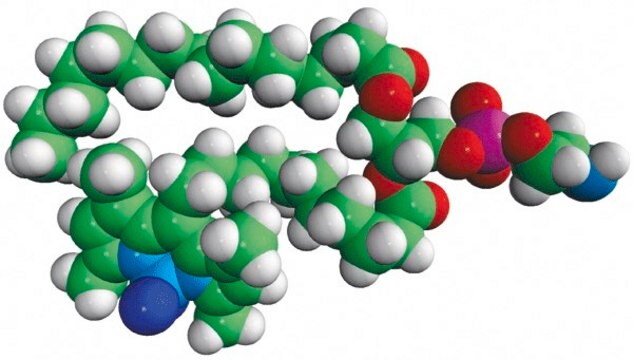P6534
Phospholipase A2 from porcine pancreas
ammonium sulfate suspension, ≥600 units/mg protein
Synonym(s):
Lecithinase A, PLA2, Phosphatidylcholine 2-acylhydrolase
Sign Into View Organizational & Contract Pricing
All Photos(1)
About This Item
Recommended Products
form
ammonium sulfate suspension
Quality Level
specific activity
≥600 units/mg protein
UniProt accession no.
storage temp.
2-8°C
Gene Information
pig ... PLA2G1B(445525)
Looking for similar products? Visit Product Comparison Guide
General description
Phospholipase A2 is a small disulfide-rich protein having 124 residues. It is a calcium-dependent enzyme.
Application
Phospholipase A2 has been used in phospholipase assay and to determine rat renal proximal tubular segments (PTS) viability during oxygenation and hypoxia-reoxygenation.
Biochem/physiol Actions
It has a high catalytic activity on aggregated substrates compared to monomeric substrates.
Hydrolyzes the β-ester bond of zwitterionic glycerophospholipids. Preferred substrates are phosphatidylcholine, phosphatidylethanolamine, and their plasmalogen analogues. Phosphatidylinositol and phosphatidylserine are also hydrolyzed. Aggressively attacks phospholipids in membranes of intact cells.
Unit Definition
One unit will hydrolyze 1.0 μmole of soybean L-α-phosphatidylcholine to L-α-lysophosphatidylcholine and a fatty acid per min at pH 8.0 at 37 °C.
Physical form
Suspension in 3.2 M (NH4)2SO4 solution, pH 5.5
Analysis Note
Protein determined by biuret.
inhibitor
Product No.
Description
Pricing
Storage Class Code
11 - Combustible Solids
WGK
WGK 1
Flash Point(F)
Not applicable
Flash Point(C)
Not applicable
Choose from one of the most recent versions:
Already Own This Product?
Find documentation for the products that you have recently purchased in the Document Library.
Customers Also Viewed
B van den Berg et al.
The EMBO journal, 14(17), 4123-4131 (1995-09-01)
The lipolytic enzyme phospholipase A2 (PLA2) is involved in the degradation of high-molecular weight phospholipid aggregates in vivo. The enzyme has very high catalytic activities on aggregated substrates compared with monomeric substrates, a phenomenon called interfacial activation. Crystal structures of
Knut Kölbel et al.
Biophysical chemistry, 206, 12-21 (2015-06-29)
Porcine pancreatic phospholipase A2, a small and disulfide rich protein, is extremely resistant against chemically or thermally induced unfolding. Despite this marked resistance, the protein displays broad unfolding transitions resulting in comparatively low apparent thermodynamic stability. Broad unfolding transitions may
R A Zager et al.
Proceedings of the National Academy of Sciences of the United States of America, 90(17), 8297-8301 (1993-09-01)
During hypoxic or ischemic renal tubular injury, phospholipase A2 (PLA2) induces membrane deacylation, causing fatty acid accumulation and phospholipid breakdown. Because these changes can compromise cellular integrity, PLA2 activity has been widely proposed as a critical mediator of hypoxic renal
Elena Venuti et al.
Journal of cystic fibrosis : official journal of the European Cystic Fibrosis Society, 16(6), 763-770 (2017-07-26)
Bile salt stimulated lipase (BSSL; Enzyme Commission (EC) number 3.1.1.13) has been a candidate triglyceridase for improving enzyme therapy for pancreatic insufficiency; however, its efficacy is near absent. We hypothesise that similarly to pancreatic lipase, BSSL is inhibited by phospholipids
B van den Berg et al.
Journal of biomolecular NMR, 5(2), 110-121 (1995-02-01)
The three-dimensional structure of porcine pancreatic PLA2 (PLA2), present in a 40 kDa ternary complex with micelles and a competitive inhibitor, has been determined using multidimensional heteronuclear NMR spectroscopy. The structure of the protein (124 residues) is based on 1854
Articles
Instructions for working with enzymes supplied as ammonium sulfate suspensions
Our team of scientists has experience in all areas of research including Life Science, Material Science, Chemical Synthesis, Chromatography, Analytical and many others.
Contact Technical Service